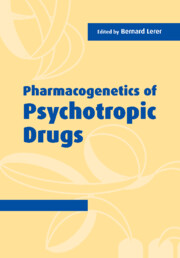Book contents
- Frontmatter
- Contents
- List of contributors
- Part I Introduction
- Part II Clinical background and research design
- Part III Molecular background
- Part IV Pharmacokinetics
- Part V Specific psychotropic drugs and disorders
- 10 Clozapine response and genetic variation in neurotransmitter receptor targets
- 11 Genetic factors underlying drug-induced tardive dyskinesia
- 12 Functional gene-linked polymorphic regions in pharmacogenetics
- 13 Alternative phenotypes and the pharmacogenetics of mood and anxiety disorders
- 14 Pharmacogenetics of anxiolytic drugs and the GABA–benzodiazepine receptor complex
- 15 Genetic factors and long-term prophylaxis in bipolar disorder
- 16 Genetic influences on responsiveness to anticonvulsant drugs
- 17 Apolipoprotein E as a marker in the treatment of Alzheimer's disease
- 18 Genetic variation and drug dependence risk factors
- Part VI Pharmacogenetics and brain imaging
- Part VII Industry perspectives
- Index
16 - Genetic influences on responsiveness to anticonvulsant drugs
from Part V - Specific psychotropic drugs and disorders
Published online by Cambridge University Press: 20 August 2009
- Frontmatter
- Contents
- List of contributors
- Part I Introduction
- Part II Clinical background and research design
- Part III Molecular background
- Part IV Pharmacokinetics
- Part V Specific psychotropic drugs and disorders
- 10 Clozapine response and genetic variation in neurotransmitter receptor targets
- 11 Genetic factors underlying drug-induced tardive dyskinesia
- 12 Functional gene-linked polymorphic regions in pharmacogenetics
- 13 Alternative phenotypes and the pharmacogenetics of mood and anxiety disorders
- 14 Pharmacogenetics of anxiolytic drugs and the GABA–benzodiazepine receptor complex
- 15 Genetic factors and long-term prophylaxis in bipolar disorder
- 16 Genetic influences on responsiveness to anticonvulsant drugs
- 17 Apolipoprotein E as a marker in the treatment of Alzheimer's disease
- 18 Genetic variation and drug dependence risk factors
- Part VI Pharmacogenetics and brain imaging
- Part VII Industry perspectives
- Index
Summary
OVERVIEW
This chapter addresses pharmacogenetic issues associated with the clinical use of anticonvulsant drugs (ACDs). Individual variability in responsiveness has been documented for nearly all ACDs in common use and current perspectives suggest that genes play a significant causal role. Variation in the DNA sequence of genes that encode drug-metabolizing enzymes is a major factor contributing to differences in drug responsiveness, and several important polymorphisms have been documented to affect the disposition of ACDs, particularly, the influence of CYP2C9 and CYP2C19 on metabolism of phenytoin and mephenytoin, respectively. Although the metabolism of other ACDs may also involve polymorphisms producing CYP isoforms, additional studies are needed to determine if these polymorphisms affect pharmacokinetics. A much greater need, however, is for studies that focus on gene variations that encode target proteins against which ACDs act. Studies that relate genetic variation to ACD pharmacodynamics will provide insight into specific gene sequences and protein structures that are most important for drug action. Additionally, this experimental strategy will have the potential of identifying previously unknown drug targets and mechanisms of action. Together, information on genetic contribution to ACD pharmacokinetics and pharmacodynamics will enable more successful and less complicated use of this class of drugs.
Introduction
Clinical experience has documented that patients with epilepsy respond in different ways to standard ACDs. Individuals with similar seizure disorders based on diagnostic criteria exhibit variable responses to the same medication, with some patients deriving significant benefit and others none at all.
Keywords
- Type
- Chapter
- Information
- Pharmacogenetics of Psychotropic Drugs , pp. 333 - 359Publisher: Cambridge University PressPrint publication year: 2002

